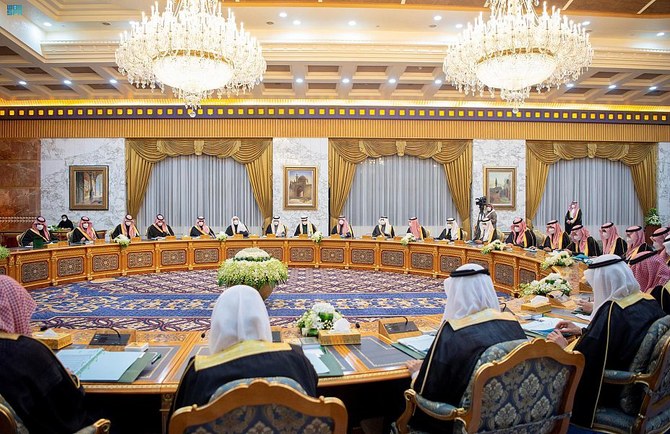RIYADH: The Saudi Cabinet on Tuesday reiterated the need to revive the Israeli-Palestinian peace process, and called on the international community to live up to its responsibilities in relation to this and to help end the occupation, stop Israeli attacks, and ensure civilians are protected.
It came during the weekly meeting of the Council of Ministers at Irqah Palace in Riyadh, presided over by King Salman, during which members discussed the latest regional and international developments, the Saudi Press Agency reported.
At the start of the session, the Cabinet was briefed on a message sent to the king by the Algerian president, Abdelmadjid Tebboune, and a telephone call Crown Prince Mohammed bin Salman received from the Russian President, Vladimir Putin.
Ministers then discussed the preparations for the Kingdom’s participation at this year’s G20 meetings, in light of its desire to develop initiatives and solutions that can help address the challenges facing the global economy.
These include a joint framework initiative for debt treatment, and Saudi Arabia’s role in the implementation of the Financial Intermediary Fund for Health Security, including financial support of $50 million, to help prevent pandemics.
They also include the Kingdom’s work in cooperation with the Indonesian presidency of the G20 last year to develop a response to the global food-security crisis, and the implementation of those initiatives in partnership with India, which holds the presidency of the G20 this year.
Acting Minister of Media Majid Al-Qasabi said the Cabinet also reiterated the Kingdom’s condemnation of the burning of copies of the Qur’an in a number of European capitals.
Ministers welcomed the signing of agreements and memorandums of understanding during the Riyadh Global Medical Biotechnology Summit last week, he added, as well as discussions during the event that focused on developments in the sector, investment opportunities, and ways to consolidate and enhance the Kingdom’s leading position in this field, in line with the goals of Saudi Vision 2030 to diversify the national economy through research and the development of scientific knowledge.
The Cabinet also noted the outcomes of the Municipal Investment Forum in Riyadh last week, during which investment portals were launched for Saudi cities, and 125 contracts and agreements worth more than SR12 billion ($3.1 billion) were signed, offering more than 5,000 investment opportunities for the private sector. During the event, about 200 projects for entrepreneurs were reviewed, and the largest investment opportunity of its kind in the outdoor advertising sector was launched.
Ministers approved a cooperation agreement between the Saudi and Uzbekistan ministries of energy, and another one between the Saudi Ministry of Education and Uzbekistan’s Ministry of Higher and Secondary Specialized Education.
They authorized the minister of culture to sign a draft memorandum of understanding for cultural cooperation with the Ministry of Crafts, Culture, Hotel Industry and Tourism in Mali, and approved a memorandum of understanding between the Saudi and Senegalese governments for cooperation to encourage direct investment.
The Cabinet also approved a MoU on desalination cooperation between the Saudi Saline Water Conversion Corporation and the Kuwait Institute for Scientific Research, and authorized the minister of health to sign a draft MoU for cooperation with the Tunisian Ministry of Health.
The minister of media, and chairman of the board of directors of the General Authority for Audiovisual Media, was authorized to sign a draft MoU with the Ministry of Information and Broadcasting in India, and the president of the Islamic University of Madinah to sign a draft MoU with the Islamic Development Bank Group.




































